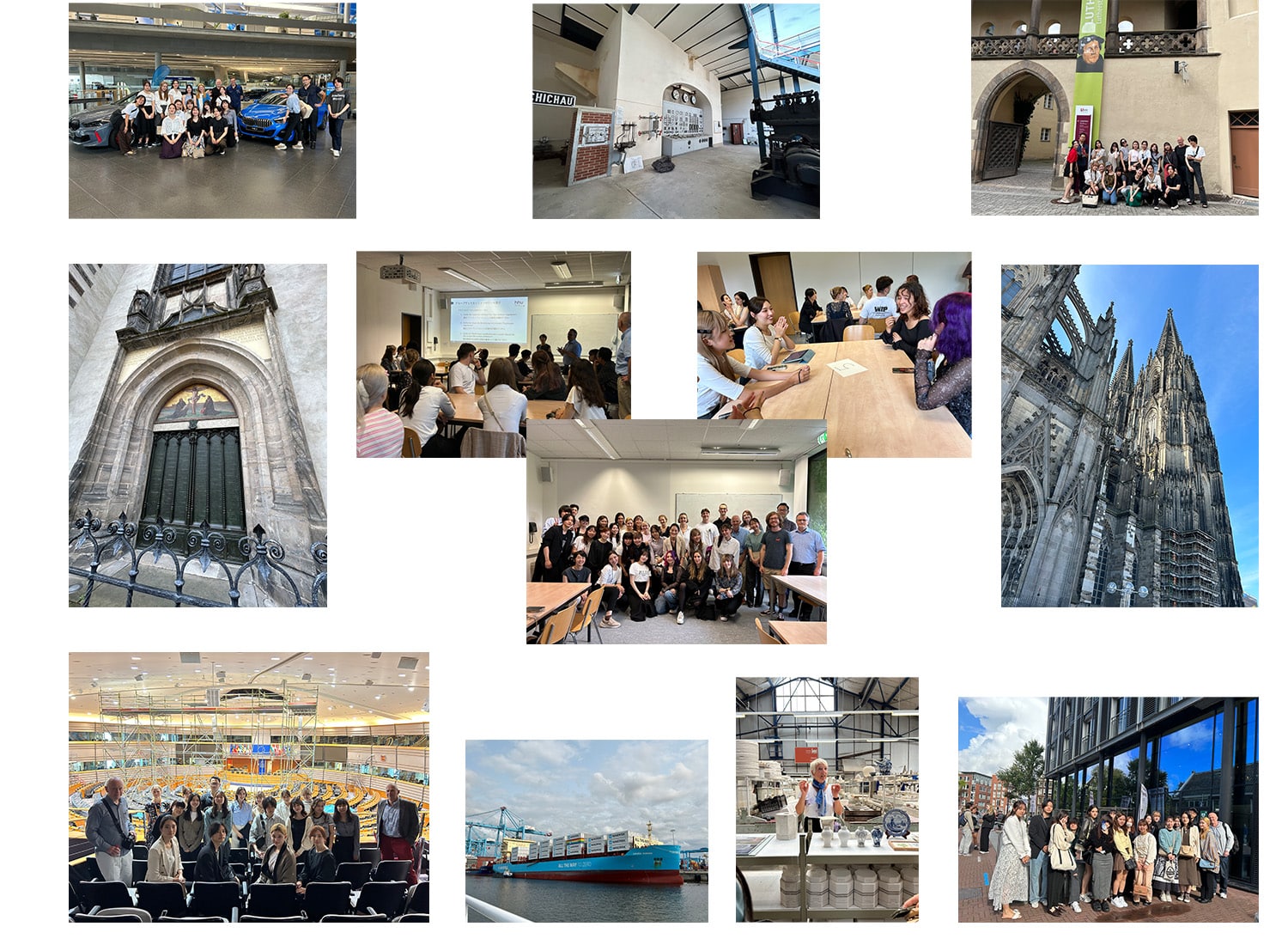- TOP
- Jean Monnet Activities
- Jean Monnet Chair (Agreement No. 2018・3245 / 004 – 001)
- TEACHING Jean Monnet Chair
- 21th August - 2nd September 2023 EU Field Study
[ Editor: Institute for Industrial Research 4th October, 2023 ]
EU Field Study 2023
Date: 21th August 2023 to 2nd September 2023
Visiting place: Germany ( Leipzig, Dessau, Düsseldorf ), Belgium ( Brussels ), The Netherlands ( Rotterdam, Delft, Amsterdam )
Program Contents: Europe’s Economies and Industries on the way to sustainable development, carbon neutrality and green growth
Coordinator: prof. Holger Bungsche
Number of Participants: 17
Objectives of the Visit:
The EU Field Study 2023 was firmly focusing on the topics of sustainable development, carbon neutrality, circular economy, renewable energies, and green growth. All the visits we had were intended to contribute one piece to a still in many aspects unclear picture of how the economies and industries in Europe and elsewhere have to change and have to be reorganized in order to achieve economic, ecological and social sustainable development, to meet the targets of net-zero by the middle of this century and by that preserve the conditions for future human living and biodiversity on planet earth. The purpose and the objective of the visits were to make students aware of the ground-breaking changes that are necessary to successfully tackle climate change, how they will have to contribute themselves to this change (in whatever profession they will be engaged after graduation) and how also their private lives will be affected in the future by these changes.
Overview:
Contents of the Visit Program and its Relation to the Objectives of the Field Study Tour
With respect to the future prospects of the use of hydrogen for production purposes as well as industrial or private fuel consumption, for this purpose we visited (a) the BMW Manufacturing Plant in Leipzig, (b) the Chemical Industry Park Bitterfeld-Wolfen as well as had a presentation from a representative of the Hypos Hydrogen Network Initiative East Germany.
With respect to renewable energies, we heard a presentation from the representative of the Energy Avantgarde Saxony-Anhalt, a large regional initiative to help achieving the German energy turnaround in three regions of Saxony-Anhalt. The same person and organization also enabled our visits of the historical industrial sites of the world’s largest steam powerplant in the 1920’s, Zschornewitz, near Gräfenhainichen, and the North Golpa lignite mining site (Ferropolis), which are both now turned into tourist attractions along the European Route of Industrial Heritage (ERIH).
In relation to the social and cultural implications of the shift to Carbon Neutrality and the “European Bauhaus” initiative of the EU Commission we visited the “old” Bauhaus Museum in Dessau.
In Brussels we visited the EU Commission where we were given presentations (a) on the work of the EU Commission and (b) on the European Green Deal. Furthermore we visited the European Parliament and the Committee of the Regions were we got informed about democracy in the EU and about the regional implications of the European Green Deal.
Related to the topic of Circular Economy we visited the Global Entrepreneur Centre in Düsseldorf as well as BlueCity in Rotterdam.
With respect to the impact of climate change on sea levels and maritime environments as well as issues of salt water intrusion in rivers and farm land, we visited DELTARES in Delft as well as Futureland which is a part of the Rotterdam harbor, where we also saw the usage of hydrogen for maritime transportation and the expansion of offshore renewable energy generation.
With respect to challenges old industries face in Europe, we visited the Royal Delft porcelain manufacturing plant in Delft as well as the Chocolate Village Museum in Brussels.
Finally, with respect to European culture, history and society we visited the Luther Church and Museum in Lutherstadt Wittenberg, the cathedral in Cologne and the cathedral and historical town of Aachen in Germany. In Amsterdam we visited the Anne Frank Huis and the Vincent van Gogh Museum.
Impact of the Visit:
The program of the 2023 EU Field Study Tour was following an integrated approach to extent the knowledge of our students with respect to the state of affairs and the challenges of European economies and industries to shift to carbon neutrality until 2050. In addition to this we also looked at traditional regional industries and we had an intensive cultural program to make students also aware of the cultural peculiarities and diversities in Europe.
In this way the field study considerably contributed to enhancing the knowledge of the participating students beyond the theoretical knowledge they acquire here at University in Japan and made them experience first-hand how the future changes will affect our economies as well as our professional and private lives.
Reactions of Students:
The overall ratings of the field study tour were amongst the highest we achieved during the whole JMC project. Below, there are three opinions of students attached:
Student 1: The two weeks went by in a flash, and I had a fulfilling field study that I could only have experienced during my time at university. Thank you so much for everything.
Student 2: It was exciting to visit places one would never be able to visit on one’s own.
Student 3: I am very much satisfied with the high quality level of the study contents of the field study tour. And, thanks to the organization and guidance of the accompanying persons we could visit all the places safely.


